peaman
Sustaining Member
Alternator is 50A. Based on your earlier post, that should be a good deal bigger?Did the PO also install an upgraded alternator with regulator?
Alternator is 50A. Based on your earlier post, that should be a good deal bigger?Did the PO also install an upgraded alternator with regulator?
With the end goal of developing a cruising power budget in which I have confidence, I am curious if careful sailboat owners switch between starting banks and house banks of batteries regularly?
My previous owner instructed me to leave the battery switch on "both" under all circumstances, and that has worked fine.
I have neither a functional ammeter or battery monitor at present and I am considering purchasing a monitor with a shunt that can display state-of-health and state-of-charge. The instructions I have read for several monitor models indicate that users are typically only monitoring the house bank, as the starter bank rarely reaches a fully discharged state.
So this brings me around to my subject line. Do you switch between your battery banks for starting your boat every time you go out? Other than isolating that bank for starting purposes with the main switch, do you have another setup that is preferable?
Do you just switch to the 'house' bank if you are at anchor or at sea, wanting to protect your starting bank?
Thanks in advance for sharing your practices.
Thanks Fernando!This is fun. A couple thing I've noted.
1. Do not switch your batteries once the engine is running. I believe this blows the diode on the alternator. i start mine on both and stay that way unless anchored.
2. A starting battery is a different of battery than a deep cycle. You use a deep cycle for electronics etc. Neither is particularly good at the others job. Or this is what i have believed to be true from all the advertising. haha!
3. Optima has a blue top battery which says its actually both a starting battery and deep cycle making it very useful in a 32-200 with only room for (2) average sized batteries under the aft berth.
4. With 2 blue tops, you would have a true backup for both house and starting.
5. I've had this setup for the last 3 years. Haven't had a worry. Use both on the dock, and switch to just one battery at anchor to preserve a battery for starting.
Thanks Fernando!
My understanding was what Christian described - don't use the big chrome "on/off" switch while the engine is operating but it okay to switch the 1/2/both dial.
I also have read in Don Casey what toddster and you mention about different battery types:
Starting batteries being specialized for short bursts of intense current (like what a gas car needs)
Deep cycle being more useful for long periods of slow draw.
In practice all of my batteries are "deep cycle" and seem to work well for starting.
As an aside - Do you have a battery bay/compartment under you V-berth? My boat came with one fully wired, so I have four battery spots. I think I have plenty of room for four 100Ah batteries, which after reading that many people go off cruising planning to rely on 1 battery alone, seems like an abundance. I should be DJ'ing a dance party with big speakers.
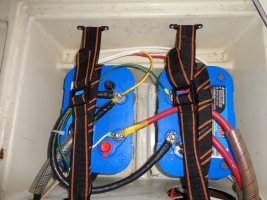
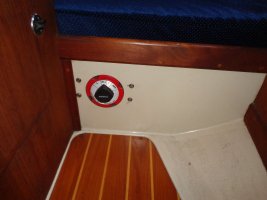
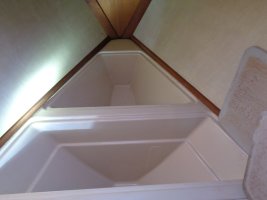
Yes, in the cubby nearest to the photographer I have a second set of batteries. Given how tidy your bay is, it seems likely that my double-installation was likely a modification by a worried owner or perhaps an upgrade by whoever commissioned my boat. Here's s picture of the teak base that someone built in to mine:V Berth has these 2 cubbys and 2 more aft. i carry tools and spares there. ill have to take a better look at whats in there. Your batteries are up here?
View attachment 40889
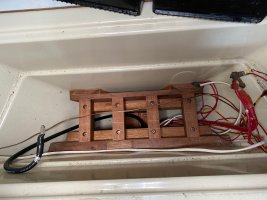
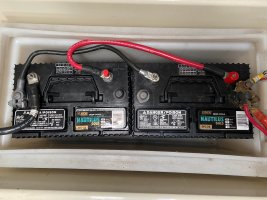
Hah, it's easy to overthink this thing, isn't it!I'm not sure how I'm supposed to feel about a 5000+ word article on a 3-position switch. I have very strong mixed feelings.
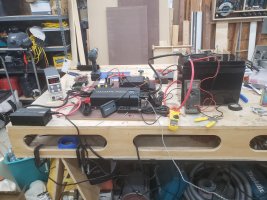
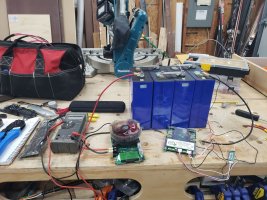
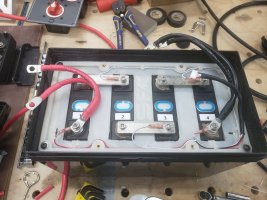
Deep cycle battery is fine for starting a diesel. No reason not to have all deep cycle batteries on a boat.
This is true IF your switch is operating correctly which is a "make before break" function. As they get old this doesn't happen consistently. The way to test it is with engine off turn on your salon lights and rotate the switch between the 1,2, and both positions & your salon lights should not dim or flicker when switching. If they do the switch needs to be replaced.My understanding was what Christian described - don't use the big chrome "on/off" switch while the engine is operating but it okay to switch the 1/2/both dial.
Venting is required for FLA and passive is OK, just remember that the tray has to be deep enough to be able to catch any spilled fluid/acid from the batteries.I believe that passive ventilation is enough - ie: a grill or louvered cutout in the "box". at least I really hope so since when I tackle this and my panel over the winter my plan is to move the batteries from the cockpit locker to somewhere lower and forward-er.
